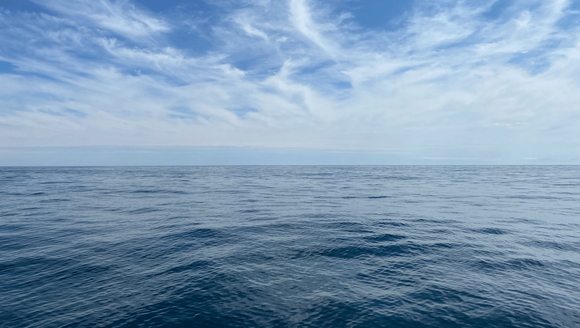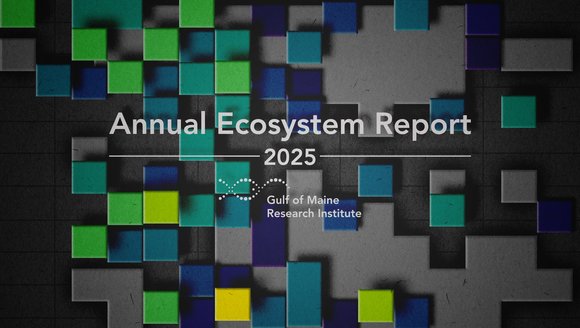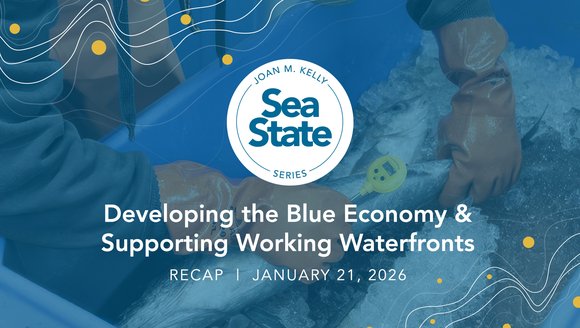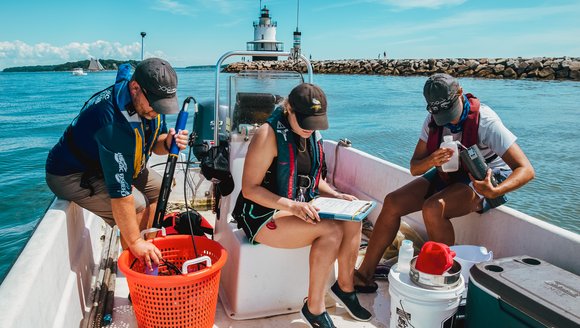20 Years on the Waterfront: Reflecting & Looking Ahead
Perspectives | Jun 3, 2025

In 2005, we opened our state-of-the-art, 44,000-square-foot marine research and education facility on Portland’s waterfront. This milestone marked a pivotal transition from our origins as the Research Institute of the Gulf of Maine, founded in 1968, and our later ambitions in 1988 to build an aquarium, into a world-class center dedicated to ocean stewardship and economic growth in the Gulf of Maine region and beyond.
The facility not only advanced our research capabilities but also became a hub for educational innovation and community engagement. In the two decades since, it has served as a launchpad for groundbreaking science, transformative learning experiences, and powerful partnerships — all in pursuit of our mission to develop solutions to global ocean challenges.
The milestones below represent more than moments in our history; they’ve prepared us for what comes next. As we take this moment to celebrate our anniversary of 20 years on the waterfront, we also look to a future in which we are poised to drive even greater impact in support of ocean ecosystems, communities, and economies that thrive for generations to come.

Founding CEO Don Perkins (far right) and others break ground in 2004
2005

The original Cohen Center for Interactive Learning in 2006

The renovated center in 2018
First On-site Educational Programming: Launching in 2005 with programming centered on Atlantic herring, titled “Mystery of the X-Fish,” LabVenture engages students through immersive education, building the confidence, competence, and curiosity to pursue science. In 2018, with funding from NASA, a reimagined LabVenture experience debuts in the newly renovated Sam L. Cohen Center for Interactive Learning. LabVenture continues to evolve and as of 2025 has provided access to hands-on science experiences for more than 170,000 middle schoolers across all 16 Maine counties.

The Yaquina Bay Bridge in Newport, Oregon
Facilitating MREP: Regional fishing leaders ask GMRI to serve as the facilitator and manager of the Marine Resource Education Program (MREP). Since then, MREP has become a nationally recognized training program that prepares fishermen, managers, scientists, and other fisheries stakeholders to navigate and participate in complex fisheries management processes. As of 2025, MREP is now involved in all eight federally managed fishing regions.
2006


A Sea State talk in the Cohen Center in 2024
Sea State Lecture Series: In 2006, with generous funding provided by Joan M. Kelly, we begin inviting scientists, seafood experts, fishermen, and other community members and partners into our building every year to lead timely and important conversations centered on the Gulf of Maine and the communities that rely on it.
2008

Heading out on a foggy morning
Intern Program Established: Our summer internship program launches, engaging undergraduates and recent graduates in scientific discovery. As of 2025, we have hosted 130+ interns across our research, communications, and community programs. Now a National Science Foundation funded Research Experience for Undergraduates (REU) site, we support a new wave of aspiring researchers and community leaders each year.
2009

Students investigating the intertidal zone in Biddeford Pool, Maine
Conducting Community Science: Through the launch of our Vital Signs platform, we provide students, teachers, community members, and researchers with the tools to monitor Maine’s environmental conditions. In 2020, with critical support from the Gordon and Betty Moore Foundation, Vital Signs becomes the Ecosystem Investigation Network — a powerful community science platform that supports field-based, collaborative research.

A data collecting buoy floats in the Gulf of Maine
Accessing and Sharing Ocean Data: In 2009, the Northeastern Regional Association of Coastal and Ocean Observing Systems (NERACOOS) technology staff joins GMRI, enabling us to combine ecosystem science with information technology and data sharing. NERACOOS collects environmental data through a network of buoys in the Gulf of Maine, providing access to real-time ocean weather data for mariners, resource managers, scientists, educators, and emergency response teams.
2011



Local Seafood Eco-Label: We create the Gulf of Maine Responsibly Harvested Seafood seal, which is applied to locally sourced seafood and designed to aid consumers’ seafood-purchasing decisions. Since its creation, $150+ million of Gulf of Maine Responsibly Harvested seafood has been sold.
2014

Sampling inshore waters using a beach seine

Alewives make their way up a small tributary of the Presumpscot River to spawn
Long-term Ecosystem Survey Launches: The Casco Bay Aquatic System Survey (CBASS) begins as a long-term effort to monitor marine life, track ecosystem changes, and inform conservation efforts. Today, it remains a vital research initiative that has deepened our understanding of Casco Bay’s nearshore ecosystem dynamics and documented shifts in species composition in response to ocean warming. CBASS also serves as a valuable training platform, providing hands-on field experience to undergraduate students and fostering collaborations with local organizations.
2015

Sunrise off the coast of House Island, Maine
Groundbreaking Publication: GMRI scientists publish groundbreaking research in the journal Science, revealing rapid warming in the Gulf of Maine — faster than 99% of the global ocean — and the associated impacts on the region’s culturally and economically significant cod fishery. This research lays the groundwork for the next decade of funding and studies aimed at using the Gulf of Maine as a testbed for how climate change would impact cold, productive ocean ecosystems globally.
2017

Ultra-low opening trawl net
Gear Development: With strict limits on cod, we collaborate with colleagues from academia and the fishing industry to develop nets that reduce fuel consumption and improve catch selectivity. Ultra Low Opening Trawl (ULOT) nets cut cod catch by 48% without impacting catch of target species.
2018

Installing a new electronic monitoring system
Electronic Monitoring: Together with The Nature Conservancy, Ecotrust Canada, and Maine Coast Fishermen’s Association, we launch an electronic monitoring (EM) program to reduce costs, improve accountability, and enhance sustainability in the New England groundfish fishery. We partner with fishermen to explore how integrated video cameras, computers, gear sensors, and GPS tools can offer a cost-effective alternative to government-mandated on-board human observers.
2019

Seafood vendor preparing a seafood shipment (left); Installing a new tide gauge sensor (right)
Ventures Capacity: Our ventures program begins to transform innovative, mission-based, for-profit blue economy startups into investable companies. As of 2025, we have helped 120+ early-stage entrepreneurs scale and connect within the blue economy.

Researchers take a measurement in Tremont, Maine

Portland Pier, inundated with water during a King Tide event
Climate Center Launches: The launch of a new climate-focused team allows us to provide coastal communities with localized climate data, support businesses as they explore climate solutions, and help fishermen and fisheries managers identify resilience strategies. We are now better suited to play a key role in helping communities navigate climate challenges and implement effective adaptation measures.

Shanlee Linney looks on as her daughters, Livia and Mikaylee, enjoy the view from the crow’s nest

REU students enjoy a moment of downtime at sea

A blue shark surfaces
Acquisition of R/V Merlin: What began as a harpoon tuna fishing vessel — known as a “stick boat” — generously donated by the Linney family, is now a state-of-the-art research and education vessel. The Merlin enables pelagic exploration up to 100 miles offshore, expanding capabilities for largescale ecosystem and fisheries monitoring.

Expanded Economics Research Capacity: The Coastal and Marine Economics lab enables us to study the mechanisms behind human decisions and behaviors, and how they relate to coastal and marine environmental changes. This research has contributed fundamental insights to seafood market dynamics, fisheries adaptation, and offshore wind planning.
2020
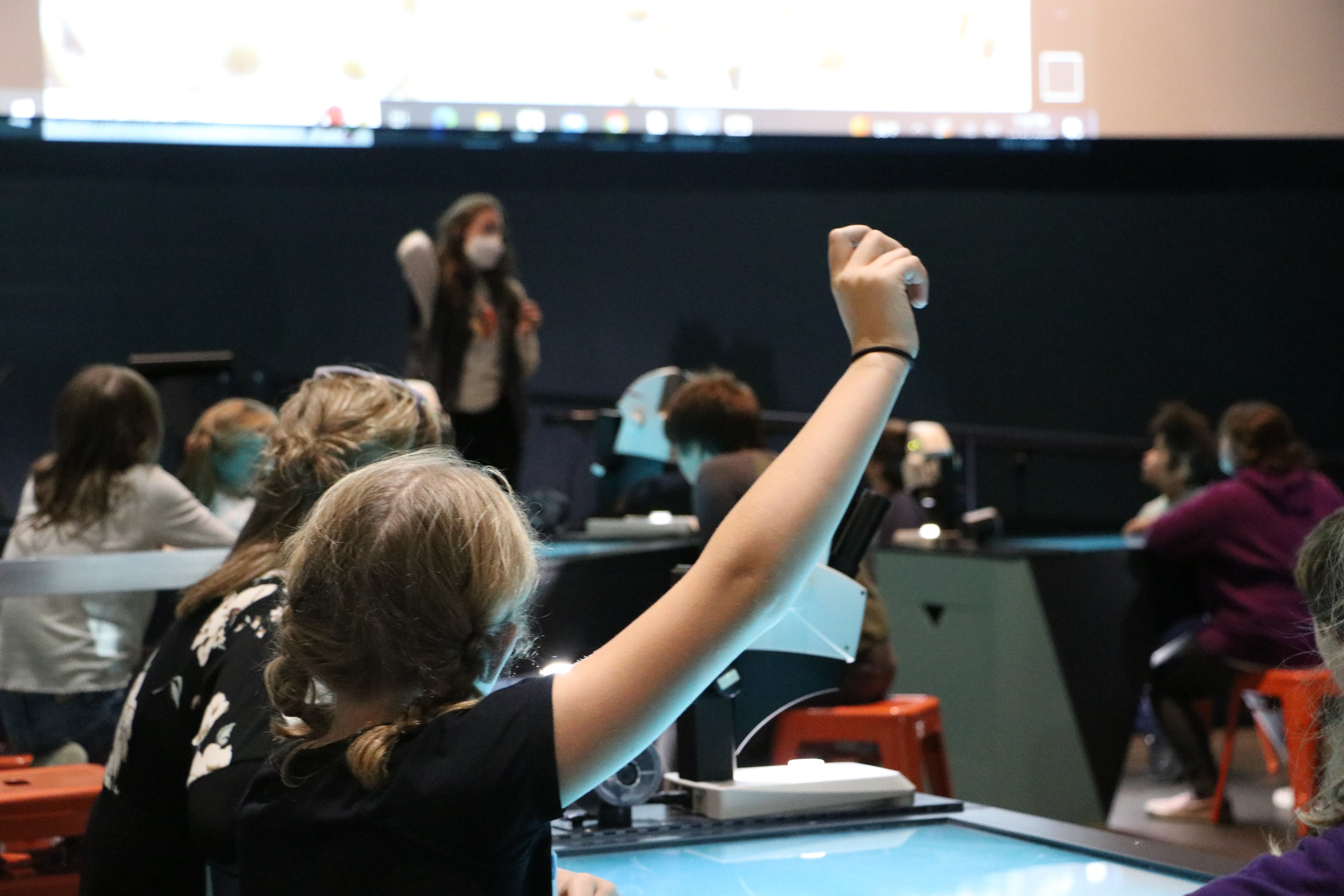
A student raises their hand
Learning Sciences Capacity: By studying human cognition and development, the Learning Sciences lab advances the scientific understanding of teaching and learning. The researchers focus on the relationships among learners, content, teaching practice, and the design of the learning context.
2021

Union Wharf, Portland, Maine
Purchasing Union Wharf: Following extensive engagement with fishing community leaders and city officials, we acquire Union Wharf — Portland’s oldest commercial wharf — to protect and preserve working waterfront access in Portland Harbor.
Annual Warming Report: In the time since our warming research was first published in Science, we emerge as the leading scientific authority on rapid warming in the Gulf of Maine. In 2021, we begin formally publishing these reports seasonally and annually to keep stakeholders, both within and beyond academia, informed about conditions in the Gulf of Maine.
2022
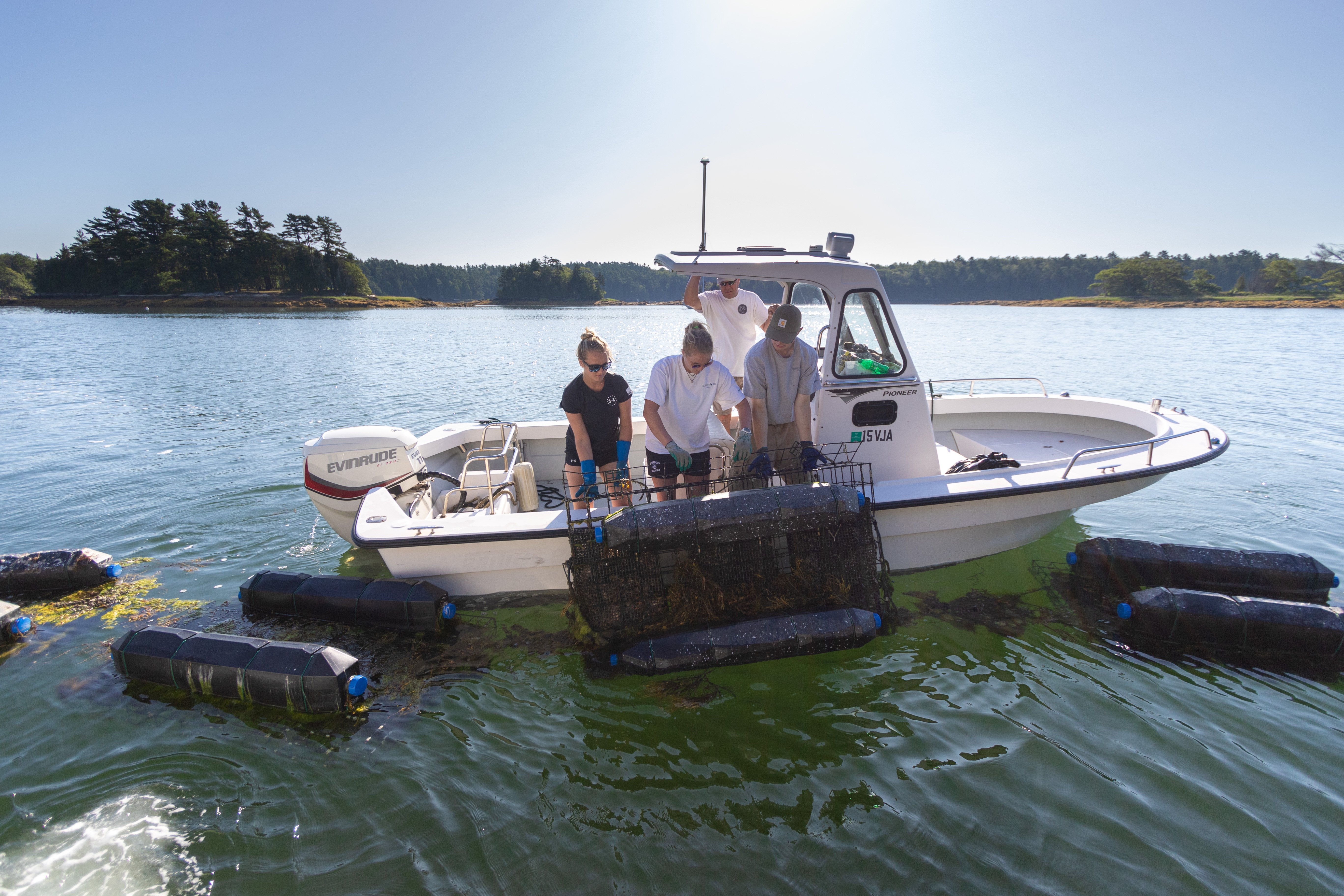
Snow Island Oysters, Harpswell, Maine
Aquaculture Apprenticeship Program: In partnership with the Maine Aquaculture Association, we launch the first aquaculture apprenticeship program in the U.S. in order to build a robust workforce. Apprentices complete 2,000 hours of on-the-job training in addition to 144 hours of classroom instruction at Southern Maine Community College.

Indigenous Partnerships: Our Indigenous partnerships program aims to grow authentic relationships and organic collaboration with Wabanaki communities to engage youth in science education experiences, support Wabanaki communities’ food sovereignty, and center Indigenous and traditional knowledge into GMRI’s ways of knowing.
2023
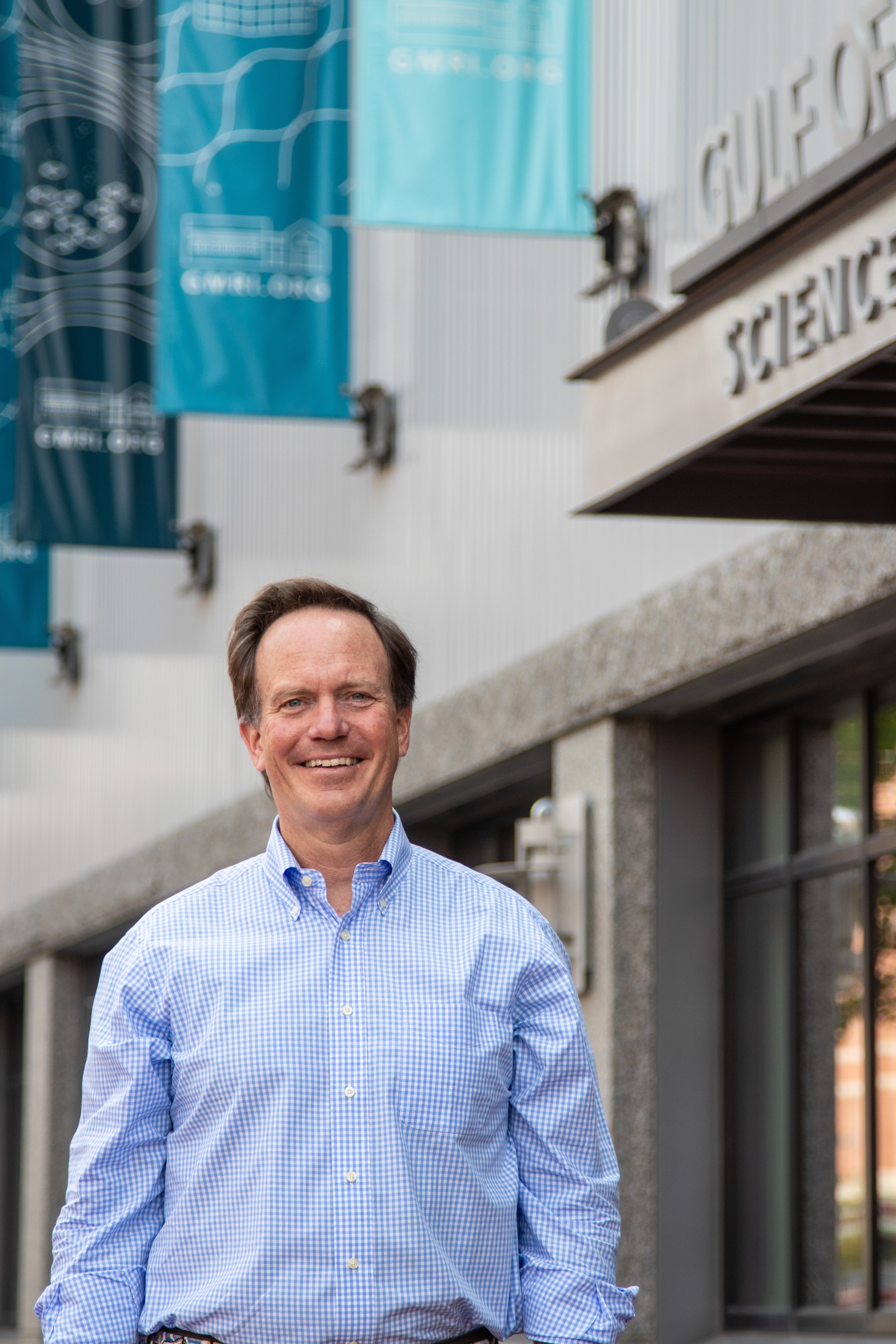
Glenn Prickett, President & CEO
New Leadership: After nearly 30 years of leadership, founding CEO Don Perkins passes the torch to Glenn Prickett, who brings 30+ years of global conservation expertise. Under Perkins, GMRI became a world-class research institute of nearly 100 staff; under Prickett, we are playing a pivotal role in achieving both local and global impact across four new strategic initiatives.
2024


The distinct markings of an Atlantic mackerel
Sustainable Seafood Program Unites Industry Leaders: The Gulf of Maine Tastemakers program unites restaurants, retailers, and institutions committed to sourcing at least 35% local seafood. In its first year, participants surpassed expectations, averaging 47% Gulf of Maine seafood sourcing.

Pipetting a sample
Molecular Lab Launch: Adding a new on-site molecular lab advances our ecosystem surveys, contributing crucial data to a variety of research initiatives, and enables us to process our own samples in our ongoing environmental DNA (eDNA) research efforts.
2025: Looking to the Future
In 2025, as part of our five-year strategic plan, we are launching four new strategic initiatives:

1. Adapting Fisheries & Seafood Marine ecosystems, fisheries, and seafood systems in the Gulf of Maine and beyond will thrive as they adapt. Local seafood will continue to provide food and jobs, deliver economic benefits, and sustain cultural connections in communities across the Gulf of Maine region and around the world. Learn more about this initiative

2. Building Climate Ready Communities Communities connected to the Gulf of Maine will successfully adapt to rapid change. Adaptation strategies will reflect a deep understanding of climate impacts and will be grounded in community values. The next generation will have the skills, knowledge, and relationships needed to thrive in a warmer world. Learn more about this initiative

3. Developing the Blue Economy & Supporting Working Waterfronts Coastal communities will be revitalized thanks to support for both traditional and emerging industries and protection of vital blue economy infrastructure. Workforce development, investment, and waterfront access will foster an ecosystem that supports inclusive wealth and community well-being. Learn more about this initiative

4. Supporting Energy Solutions Energy solutions in the Gulf of Maine — including marine renewables, grid resilience, efficiency improvements, and coastal electrification — will bring environmental, economic, and societal benefits to the region, as they are based on the best-available science and inclusive community engagement. Learn more about this initiative
We envision a future in which the ecosystem, economy, and communities of the Gulf of Maine region thrive amid rapid change.
We share this vision with a broad network of partners, philanthropists, and community leaders who understand that real progress takes collaboration, commitment, and courage.
With the launch of our new strategic plan, we’re building on the momentum of 20 years and sharpening our focus on what’s needed most in the years ahead. We’ve identified a path to impact through four new strategic initiatives, which will guide our work for the next five years and beyond.
Together with our community, we’ll continue our mission to develop and deliver collaborative solutions to global ocean challenges. We hope you’ll join us in bringing this future to life.
Glenn Prickett
President & CEO
Support Our Work
Your gift supports thriving ocean ecosystems, communities, and economies for generations to come.
Our Strategic Plan
In 2025, we identified four new initiatives to guide our work through 2030. Explore our work for opportunities to join us as a project partner, program participant, donor, or community advocate.
